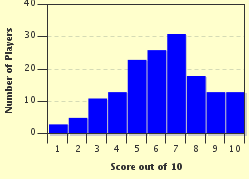Quiz Answer Key and Fun Facts
1. One of the very oldest board games in the world is known as Senet. If I told you that the game was represented by hieroglyphics, which country would lay claim to this ancient game?
2. About 4600 years ago, one of the very first board games with rules that are still known today was played. It shares its name with a Mesopotamian city, and the text-speak for "you are". It's therefore known as the "Royal Game of..." what?
3. The family of games known as Mancala, which includes dozens of variations, is an example of what type of game?
4. The ancient game of Chess actually had a predecessor, called Chaturanga.
5. Vaikuntapaali, dating back to 16th Century India, was the inspiration for which modern board game?
6. Which ancient Chinese board game shares its name with the starting square on the original Monopoly board?
7. "Tafl" was a form of medieval chess, also known as "Viking Chess". As the name suggests, where did this game originate?
8. The game Monopoly, released in 1933, was a brand new board game with concepts and gameplay never before seen (as far as research has established).
9. An early game similar to Tic-Tac-Toe, this game partially shares its name with a form of English folk dance. Played as early as 1400 BC, it is known as "Nine Men's..." what?
10. Games based primarily on answering trivia questions have only surfaced realtively recently in the history of board games. When and where was the first thought to have been invented?
Source: Author
timence
This quiz was reviewed by FunTrivia editor
WesleyCrusher before going online.
Any errors found in FunTrivia content are routinely corrected through our feedback system.

